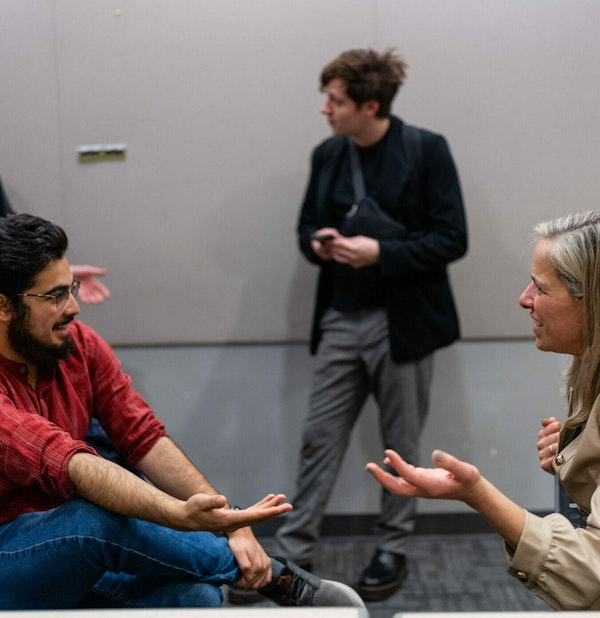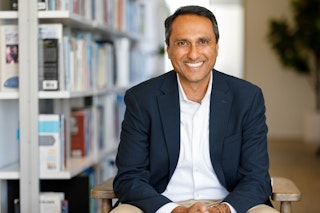Connecting on campus
U.S. universities are the ideal place to teach Americans how to cooperate
 Gaza war protest at Harvard University in Cambridge, Mass on April 25, 2024. (Ben Curtis / AP Photo)
Gaza war protest at Harvard University in Cambridge, Mass on April 25, 2024. (Ben Curtis / AP Photo)
In April, Harvard released two long-awaited taskforce reports on antisemitism and anti-Muslim bias, drawn from more than 50 listening sessions and hundreds of student accounts. In some 500 pages, the reports detail the ways identity-based tensions have fractured life on campus, including the hostility and social exclusion facing Jewish students and the stereotyping and name-calling facing Muslim students. In his introduction to the reports, Harvard’s Interim President Alan Garber acknowledged the depth of the problem, saying, “I’m sorry for the moments when we failed to meet the high expectations we rightfully set for our community.” To respond, and following the recommendations of the task force, he announced a new institutional commitment to pluralism grounded in cooperation across the lines of identity and ideology.
Reading through these reports, I was reminded of my own shortcomings in standing up to antisemitism. I recalled an experience in high school when I did not stand up for a Jewish friend experiencing harassment. A group of students had taken to scrawling antisemitic slurs on classroom desks and shouting them in the hallway. I did not confront them. I did not comfort my Jewish friend. Instead, I averted my eyes from the bigotry and I avoided my friend because I couldn’t face him.
A few years after we graduated, this friend reminded me of that experience. He told me he had feared going to school during that period, and that he had felt abandoned by his close friends, who did nothing. Listening to him tell me of his suffering and remind me of my silence is the single most humiliating experience of my life.
My inaction as a teenager was a betrayal of both my Muslim faith and the ideals of America. People of all faiths and identities – Jews, Muslims, Black Americans, gay people, and more – should not just be tolerated in this country, but should feel safe and welcome. My friend needed more than my silent presence at the lunch table. In the words of the great American poet Gwendolyn Brooks, “We are each other’s business; we are each other’s harvest; we are each other’s magnitude and bond.”
Harvard’s findings on Islamophobia also echoed the concerns I carry as a father to two Muslim boys. My oldest heads to college this fall. We’ve raised him to be confident in who he is, yet I still wonder how he’ll be received – whether others will make assumptions or expect him to explain or downplay parts of his identity. What I want for him – and for every student – is a campus where faith traditions become bridges to connection, not barriers to belonging.
 Eboo Patel greets students after an event, University of Wisconsin–Madison, March 12, 2025. (Althea Dotzour / University of Wisconsin-Madison)
Eboo Patel greets students after an event, University of Wisconsin–Madison, March 12, 2025. (Althea Dotzour / University of Wisconsin-Madison)
The perfect place to start
Universities, among the greatest treasures of our civilization, are the best places to put pluralism into practice. Where else do you get such a wide range of identities converging in a small physical space, along with the intellectual resources to teach about the world’s great traditions and the extracurricular opportunities (such as intramural sports, student clubs, and volunteer programs) to apply what you learn?
Unfortunately, recent polling by Gallup and the Lumina Foundation shows that public confidence in higher education has declined sharply in the last 10 years, from 57% to 36%. Harvard’s scathing reports won’t help matters. To regain the public’s trust, American universities shouldn’t become more like Fortune 500 companies or like social-justice advocacy groups, as some pundits have argued. They need instead to reclaim their core purpose – what the Catholic philosopher and theologian Alasdair MacIntyre described as initiating students into the conflicts inherent in a diverse democracy, and preparing them to articulate and order those arguments in a reasonable way.
The most concrete way to prepare students for life in a diverse democracy is through intentional diversity work. But over the past decade, such efforts have too often relied on a framework that divides students into the fixed roles of oppressor and oppressed, rather than encouraging pride in students’ traditions and in the identities they carry.
A better approach would be to exercise the muscles of cooperation across difference. This means expanding students’ knowledge base, teaching them the skills, and nurturing the qualities necessary for bridgebuilding. Bridges of cooperation don’t fall from the sky or rise from the ground; they are built by people.
The good news is that a pluralism movement is already growing on numerous campuses. Several schools now teach courses on civil discourse, and a handful have built centers like the Wheatley Institute at Brigham Young University, the Vanderbilt Project on Unity and American Democracy, the Difficult Conversations Lab at Columbia University, the Karsh Center for Law and Democracy at the University of Virginia, and the Othering and Belonging Institute and the Greater Good Science Center, both at the University of California, Berkeley.
These ventures represent a good start, but they’re not nearly enough. Our nation needs every university campus not only to house a center for pluralism but to be a center for pluralism. Campuses should be places where people from diverse identities and divergent ideologies learn from one another, not shout at one another.
 Sasha O'Connell and Taha Vahanvaty debate during American University’s “Disagree with a Professor” event on Feb. 22, 2023. (Eric Lee / The Washington Post via Getty Images)
Sasha O'Connell and Taha Vahanvaty debate during American University’s “Disagree with a Professor” event on Feb. 22, 2023. (Eric Lee / The Washington Post via Getty Images)
Laboratories of change
In this model, campuses would gather faculty, advance research, teach courses, host guest lectures and, most important, train students to be leaders in pluralism. Universities could also administer surveys to gauge the pluralism orientation of their students. They could run workshops during first-year orientation to ensure every incoming student has the basic skills necessary for holding constructive conversations across differences. And they could organize student fellowships to prepare a small number of people to practice and facilitate pluralism professionally after graduation.
Such programs could draw on the impressive extant literature on pluralism written by both academics and journalists. These works include classic texts on political philosophy like Talking to Strangers: Anxieties of Citizenship since Brown v. Board of Education by Danielle Allen, Cosmopolitanism: Ethics in a World of Strangers by Kwame Anthony Appiah, and Confident Pluralism: Surviving and Thriving Through Deep Difference by John Inazu. They also include books in political science that explore our partisan divide, like Uncivil Agreement: How Politics Became Our Identity by Lilliana Mason and Divided We Fall: America’s Secession Threat and How to Restore Our Nation by David French. There is a whole tradition in sociology that looks at how groups either come apart or come together, including studies by Muzafer and Carolyn Sherif on contact theory and virtually everything that Robert Putnam has written. Universities can draw on important books in moral psychology that look at the role of identity formation in relation to conflict, like Jonathan Haidt’s The Righteous Mind: Why Good People Are Divided by Politics and Religion and Appiah’s The Lies That Bind: Rethinking Identity. And they can turn to the growing body of work by practitioners that highlights the skills of strengthening relationships across difference. These include Mónica Guzmán’s I Never Thought of It That Way: How to Have Fearlessly Curious Conversations in Dangerously Divided Times, Amanda Ripley’s High Conflict: Why We Get Trapped and How We Get Out, Peter Coleman’s The Way Out: How to Overcome Toxic Polarization, Eric Liu’s Become America: Civic Sermons on Love, Responsibility, and Democracy, David Brooks’ How to Know a Person: The Art of Seeing Others Deeply and Being Deeply Seen, and Arthur Brooks’ Love Your Enemies: How Decent People Can Save America From Our Culture of Contempt.
Even if a campus isn’t currently facing tensions like Harvard’s, it may well do so around any number of issues in the future. A diverse democracy like ours will never run out of things that divide people. We want to allow students to protest respectfully on the quad, but we also need them to work together to find cures for cancer in our laboratories and to collaborate on new technologies in our engineering schools.
The benefits of this approach should redound far outside of higher education. We need to equip our future leaders with the knowledge and skills to ensure that Americans can disagree on some fundamental things while working together on others. Employers from virtually every sector are already seeking to hire people with the skills to turn potentially contentious issues – such as how to approach diversity in hiring practices – into opportunities for collaboration rather than conflict.
Barriers like racism, misogyny, Islamophobia, and antisemitism prevent people from contributing to our diverse society. These problems need to be called out and defeated. But the eradication of prejudice is not enough; starting with our schools, we must proactively build a diverse democracy that cherishes the contributions of all.
During every past generation, American campuses have stepped up to help address the country’s urgent needs. Right now, the United States faces a crisis of polarization and division and urgently needs more collaboration and cooperation across differences. To better serve the nation and improve themselves, universities need to become laboratories and launching pads for pluralism, because, ultimately, as Brooks taught us, “we are each other’s business.”
This essay was adapted from a piece previously published in Deseret News, with assistance from Rollie Olson.
The Catalyst believes that ideas matter. We aim to stimulate debate on the most important issues of the day, featuring a range of arguments that are constructive, high-minded, and share our core values of freedom, opportunity, accountability, and compassion. To that end, we seek out ideas that may challenge us, and the authors’ views presented here are their own; The Catalyst does not endorse any particular policy, politician, or party.

